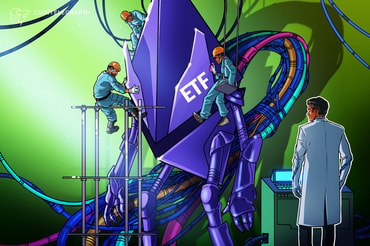Starknet Claims to Shatter Transaction Speed Record Among Ethereum Layer-2 Networks

Election 2024 coverage presented by
Starknet, a zero-knowledge rollup, said Wednesday it had shattered the record for transactions per second (TPS) among Ethereum layer-2 networks.
According to the team, Starknet reached “a max TPS of 127.5 over the past 24 hours.”
“The milestone occurred during a gaming stress test, which was dubbed ‘dress rehearsal for mass use via L2s,'” a press release stated.
A Starknet spokesperson wrote in an email that the feat knocked Coinbase’s layer-2 network, Base, off the top spot, beating Base’s record 24-hour TPS of 79.92 TPS “by a large margin,” citing the website L2Beat.
CoinDesk reached out to Coinbase, and a spokesperson responded: “Overall, Base’s mission is to bring a billion people onchain, and we know we can’t do that alone. Faster and cheaper onchain transactions are an important step to making this technology more accessible to everyone. We believe a rising tide raises all boats, and we’re glad to see progress toward even faster onchain transactions across the ecosystem.”
Starknet is seen as one of the top teams building layer-2 networks atop Ethereum, due to its sophisticated cryptography and technical attributes – even though it ranks lower than rival projects on leaderboards of top destinations for decentralized-finance (DeFi) protocols. Its total value locked (TVL) — a measure of deposits socked into protocols on the network — currently stands at $235.7 million, according to DeFi Llama. That’s well behind Base’s $2.64 billion and Arbitrum’s $2.44 billion.
But the layer-2 projects are competing on other key metrics – including speed, interoperability and the degree of decentralization.
The latest “stress test” of the Starknet network was a joint effort between StarkWare, game development firm Cartridge and the Starknet Foundation.
Some 11 million daily transactions were recorded, and the peak TPS was 857, according to the team.
“The stress test was conducted with a game called ‘flippyflop,’ developed by Cartridge,” a press release stated. “The tile game saw users competing against bots to check tiles on the grid. Bots worked to undo the gamers’ work by unchecking tiles at random. As such the theme was ‘human vs. machine.’ The high pace of simple transactions generated during this game was designed to be the ultimate test for Starknet’s TPS.”
It should be noted that Starknet’s TPS test may not be an apples-to-apples test comparison versus other networks.
In other contexts, such as with zero-knowledge provers — a crucial component within many blockchain systems — there have been special efforts to conduct tests in a controlled environment.
And often there are tradeoffs – speed versus decentralization, for example.
Read more: What Are Rollups? ZK Rollups and Optimistic Rollups Explained
UPDATE (17:48 UTC): Adds comment from Coinbase spokesperson.
Edited by Aoyon Ashraf.
Disclosure
Please note that our privacy policy, terms of use, cookies, and do not sell my personal information have been updated.CoinDesk is an award-winning media outlet that covers the cryptocurrency industry. Its journalists abide by a strict set of editorial policies. CoinDesk has adopted a set of principles aimed at ensuring the integrity, editorial independence and freedom from bias of its publications. CoinDesk is part of the Bullish group, which owns and invests in digital asset businesses and digital assets. CoinDesk employees, including journalists, may receive Bullish group equity-based compensation. Bullish was incubated by technology investor Block.one.
Bradley Keoun is the managing editor of CoinDesk’s Tech & Protocols team. He owns less than $1,000 each of several cryptocurrencies.

Published on Other News Site












